IRB Profiles
-
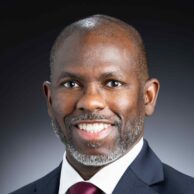
Davis, Cleon
Engineer, Teacher, BFSA Leader - 2025 Inductee
Davis,
Cleon

Davis, Cleon
Engineer, Teacher, BFSA Leader - 2025 Inductee
As a Johns Hopkins engineer, Cleon Davis designs satellite constellations that help connect and protect the globe. As a leader at Johns Hopkins, he’s worked from within to press for institutional change and expand opportunity.
“I’ve always wanted to make the places I’ve worked better for the people who come after me,” he says.
Raised in Riviera Beach, Florida, Davis earned electrical engineering degrees from Florida A&M University then a PhD from the Georgia Institute of Technology. Along the way, he modeled combustion engines for Ford, studied lasers at a Navy lab, and designed acoustic sensors to improve semiconductor packaging.
While finishing his doctorate, he found the Johns Hopkins University Applied Physics Laboratory through a career fair hosted by the National Society of Black Engineers. The lab’s hybrid of research and real-world application appealed to him immediately—“not purely academic, not purely industry,” he says. “APL was right in that sweet spot.”
Today Davis leads both people and programs at APL. He serves as program manager in the National Security Space Mission Area of the Space Exploration Sector, where his team models satellite constellations essential to GPS, global internet, and national defense. “We can’t afford to be wrong,” he says.
Equally significant to Davis is his role as a professor—and, since 2024, as chair—of the Electrical and Computer Engineering program at Johns Hopkins University Engineering for Professionals. Under his guidance, the graduate program—now majority online—has grown to be the largest of its kind in the nation, with over 100 courses and 80-plus faculty members. Davis has personally mentored dozens of students through their thesis work.
Early in his time at Johns Hopkins, Davis found community in the Black Faculty and Staff Association, where he served in various leadership roles before becoming president in 2015. In his two years at the helm, Davis opened new lines of dialogue with university leadership and worked to improve access and representation in hiring. During that time, he also helped launch a strategic mentoring program at APL, pairing junior staff with senior advocates to boost careers and overcome structural barriers to advancement.
Davis says he’s proudest of the colleagues he’s supported and watched thrive—those who were once overlooked or stuck, but now leaders. “If I’ve made it easier for someone else to succeed,” he says, “then I’ve done something meaningful.”
-
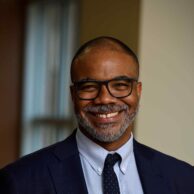
Connolly, Nathan
Historian, Intellectual Leader - 2025 Inductee
Connolly,
Nathan

Connolly, Nathan
Historian, Intellectual Leader - 2025 Inductee
A leading historian of race, capitalism, and power, Nathan Connolly has spent his career exposing how institutions create and uphold inequality, with work that bridges academic scholarship and public discourse.
Connolly’s 2014 book, A World More Concrete, reframed the story of segregation by showing how landlords, officials, and developers in South Florida—where he grew up—profited by systematically excluding Black communities from property and power in the Jim Crow era. As a lead architect of Mapping Inequality, the digital project that made 1930s redlining maps accessible to the public, Connolly helped uncover how government-sanctioned racism shaped American cities. The resource attracted over a million users, becoming indispensable to educators, policymakers, and activists.
After earning his PhD in history from the University of Michigan, Connolly joined Johns Hopkins in 2008. He immediately saw the university as both a place of profound potential and a reflection of historical exclusions. “I really do believe in the importance of universities as protectors of possibility for civil society,” he says. “But you have to be willing to take a close investigation of your own intellectual practices.”
That conviction pulled him into the university’s inner workings: faculty searches, committees, curricular reforms. He has mentored students, launched programs, and pushed Johns Hopkins to reckon more deeply with its own history and responsibilities.
As director for five years of the Racism, Immigration, and Citizenship program (now the Chloe Center), Connolly helped secure a $4.4 million Mellon Foundation grant to amplify Black humanities scholarship and deepen ties to Baltimore communities. A major outcome was the creation of the Critical Diaspora Studies major. “Students were telling us, ‘We can’t go out as doctors or scientists without understanding the cultural problems our patients will face,’” Connolly says.
With his late wife, Shani Mott, and Jennifer Kingsley, director of JHU’s Program in Museums and Society, Connolly co-led Housing Our Story, an oral history project recording the experiences of Black staff at Hopkins. These narratives—capturing exclusion, resilience, and dignity—helped fuel structural change, including the launch of the university’s Staff Advisory Council in 2023.
During his time at Johns Hopkins, Connolly has mentored an emerging generation of scholars who have become authors, professors, and leaders themselves, extending the influence of his teaching.
Connolly emphasizes that his legacy at Hopkins has been inextricably linked with Mott, a beloved Africana Studies lecturer who passed away in 2024. “In all things, and in all ways, my time at Hopkins is her time at Hopkins,” he says. “She was my thought partner and collaborator, and so there is no distinction.”
-
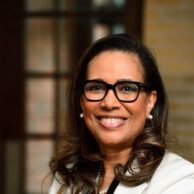
Hobbs, Cherita
Human Resources Strategist, Community Pillar - 2025 Inductee
Hobbs,
Cherita

Hobbs, Cherita
Human Resources Strategist, Community Pillar - 2025 Inductee
Baltimore-area native Cherita Hobbs started working at Johns Hopkins in 1981, a young administrator supporting the university’s Human Resources office. That first job launched a path that would make her a defining presence in HR leadership at Hopkins, helping shape policies, culture, and support systems across nearly every corner of the institution.
Over the years, Hobbs has led HR programs and operations for the schools of Medicine, Public Health, Nursing, JHPIEGO, and the Johns Hopkins Federal Credit Union, and later assumed a university-wide leadership role in employee and labor relations. Today, as executive director of strategic human resources, she oversees HR services for 11 academic divisions and four academic centers, with a focus on efficiency, workforce diversity, central HR operations, and employee engagement.
“What excites me most is the opportunity to support staff at all levels,” says Hobbs. “HR has given me a platform to navigate complex and sensitive staffing matters with care, fairness, and compassion.”
Hobbs is known for pushing HR systems to evolve with the needs of the people they serve. Over the years she has negotiated numerous contracts with bargaining units and mentored thousands of employees and managers, showing “a tremendous capacity to listen and demonstrate empathy for the challenges employees face,” according to Kathy Forbush, executive director of Talent Management at Johns Hopkins.
As one of the longest-serving Black women in senior leadership at Hopkins, Hobbs has co-chaired diversity councils, advised on economic inclusion, and worked to advance equity in hiring and advancement. She was an early advocate for the HopkinsLocal initiative, partnering with university offices and leaders boost hiring directly from the surrounding Baltimore community.
“Cherita has been a fierce advocate of creating more equitable workplaces where all JHU employees, especially those who are historically underrepresented, can grow, thrive, and be successful,” Forbush says.
Hobbs holds both a bachelor’s and master’s degree from the Johns Hopkins School of Professional Studies and remains an active contributor to university committees focused on inclusion, policy, and HR strategy.
“It has been an honor to grow my career at JHU, and even more meaningful to know that my work has had a positive impact on both leadership and staff,” Hobbs says. “I am deeply grateful to the IRB for recognizing my commitment and dedication, and for the privilege of being inducted into this prestigious program.”
-
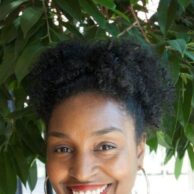
Mott, Shani
Scholar & Social Justice Champion - 2025 Inductee
Mott,
Shani

Mott, Shani
Scholar & Social Justice Champion - 2025 Inductee
Anyone who took a class with Shani Mott learned quickly not to coast. Her expectations were high—because she viewed her students as thinkers whose ideas mattered.
“She made students have to respect Africana Studies as a major,” said her husband and longtime collaborator, historian Nathan Connolly. “You couldn’t just waltz in. You had to deal with Dr. Mott.”
As a lecturer in the Center for Africana Studies and Department of History at Johns Hopkins, Mott left an imprint beyond her title. Her influence stretched across institutional reform, public scholarship, and the lives of students and colleagues who found in her an unflinching advocate.
Before joining Johns Hopkins, Mott earned her doctorate from the University of Michigan and led Africana Studies at Barry University. Her work often blurred the lines between academic and activist. Trained in American culture and literature, she probed how racial language is molded by intellectual hierarchies, funding agendas, and government policy. In her teaching, she pushed students to interrogate how those forces played out in their own lives.
She taught with “a rigor and perspicaciousness that was infectious,” says Minkah Makalani, director of the Center for Africana Studies at Johns Hopkins. “Her students understood that she demanded they take themselves seriously as thinkers.”
One of her most visible contributions at Johns Hopkins was the Housing Our Story oral history project, in which she interviewed Black campus workers whose voices had long been excluded from the university’s archives. The effort led to meaningful reform, including the 2023 launch of a Staff Advisory Council and shifts to equity policy. “She was an incredible interviewer,” Connolly recalls. “In the wake of her earnest questions, many of these people wanted to know, ‘What are you going to do with our story? How can we actually go about changing the institutional landscape?’”
Mott also helped organize the Freedom Papers exhibit at the Sheridan Libraries in 2016 and, in 2017, the Life Sentences conference on incarceration and the humanities, projects that centered lives and perspectives rarely highlighted in official narratives.
A driving force behind the intellectual renewal of Africana Studies, Mott fought to make the field a space of both academic rigor and political seriousness. As director of undergraduate studies for the center, she reshaped how the program was perceived, particularly by STEM students who gravitated to her courses. Beyond campus, she co-directed Orita’s Cross Freedom School and created an educational YouTube series during the pandemic.
Mott died of adrenal cancer in March 2024, just shy of her 48th birthday. Her final public act was testifying in an eight-hour deposition for a housing discrimination lawsuit she and Connolly had filed—arguing that their home in a historically white Baltimore neighborhood had been appraised at far lower value because they were Black.
“I had the chance to see firsthand her literally put her life on the line for justice,” Connolly said. “Her ability to speak forcefully and be so crystal clear about how real estate works—it was a master class.”
-
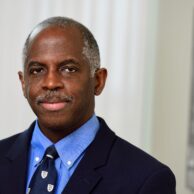
Blankson, Joel
Champion of Science & Dedicated Mentor
Blankson,
Joel

Blankson, Joel
Champion of Science & Dedicated Mentor
As a clinical fellow at Johns Hopkins in the early 2000s, Joel Blankson encountered a patient living with HIV who, remarkably, required no medication to control the virus. Blankson’s fascination with the phenomenon—known as elite suppression—set the course for his pioneering career in HIV research.
Blankson first recognized the scientific urgency of HIV as a college student in New York City during the height of the AIDS crisis. Through a tri-institutional program across Cornell, Rockefeller University, and Memorial Sloan Kettering, he earned his Ph.D. in immunology and his medical degree back-to-back.
Now a professor of medicine and molecular and comparative pathobiology at the Johns Hopkins School of Medicine, Blankson is internationally recognized for his leadership in HIV cure research.
As a clinician, Blankson has led the inpatient HIV service at Johns Hopkins since 2008, his work at the beside driving his clinical observations. As a teacher, he personally trained every Osler medical resident in HIV care between 2010 and 2020.
At Johns Hopkins, Blankson has also played a critical behind-the-scenes role advancing diversity in medicine—reviewing thousands of applications from underrepresented candidates and helping build a mentoring pipeline to strengthen graduate school, residency and fellowship programs for more than two decades. “That work matters to me,” he says.
Many of those he helped recruit are now faculty at Johns Hopkins and other institutions, his nominators note, “and still consider Joel to be their mentor and advocate.”
-
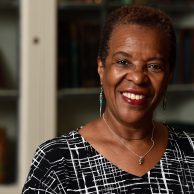
Addison, Betty
Innovative public-health careers coach
Addison,
Betty

Addison, Betty
Innovative public-health careers coach
During her forty-two-year career at the School of Hygiene and Public Health (now the Bloomberg School of Public Health), Betty Hall Addison had a knack for recognizing and filling voids no one else noticed. Starting in 1978 as administrative aide to the dean of students, Addison says she arrived “with a business degree and good office skills.” As she dealt with numerous nonacademic issues and listened to students’ personal concerns, she quickly realized that many matters, particularly job counseling for students and recent graduates, were not being addressed.
To fill the vacuum, Addison began to mentor students as they prepared resumes and coach them on interviewing skills. In 1984, she organized the school’s first job fair and invited twelve local agencies and firms to participate. With an ever increasing understanding of students’ needs, the following year Addison began an intense program to secure a master’s degree in counseling at the Johns Hopkins School of Education, then on the Homewood campus. She completed her degree in just eighteen months of night classes while still working full time, even serving briefly as acting dean of students. “I never said, ‘that’s not my job,’” Addison explained, “I just did it, whatever it was they asked me to do.”
Fortified with her new credentials, Addison pushed for and established new initiatives in the School of Public Health, including Offices of Student Services, Career Services, and Disability Support Services. Later, she became a Fulbright Scholar and spent two months in Germany studying the activities of school administrators at every educational level; she returned with new insights for the East Baltimore campus.
In 1994 Addison started the Diversity Summer Internship Program (with funds from the National Institutes of Health to provide participants’ wages) for top science students at Dunbar High School to work on research projects at the School of Public Health. Over the years the program evolved to include underrepresented college students and science teachers from all over the United States and now attracts more than six hundred applicants to fill up to twenty positions each summer.
Over her career, Betty Hall Addison worked tirelessly to teach career strategies to public-health students and graduates, suggesting innovative ways to design, plan, and implement job searches in a competitive market. Also involved in the wider Johns Hopkins community, Addison was a member of the Black Faculty and Staff Association since its inception and served as its president in 2004–5. Focusing on leadership skills and encouraging an environment that promotes success, she became a Certified Executive and Leadership Development Coach. Since retiring in 2019, she continues to work part-time through the Health Policy Research Scholars Program of the Robert Wood Johnson Foundation.
-
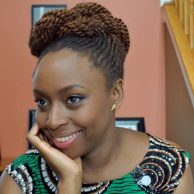
Adichie, Chimamanda Ngozi
Storyteller: Humanizing Stories for the World
Adichie,
Chimamanda Ngozi

Adichie, Chimamanda Ngozi
Storyteller: Humanizing Stories for the World
“Literature,” says Chimamanda Ngozi Adichie, “is the best way of humanizing people.” Considering a character’s motivation, she believes, “forces us to look beyond stereotype.” An internationally celebrated author, Adichie conducts workshops for young writers in her native Nigeria, where she emphasizes that “storytelling is rooted in our political, our social, our emotional realities,” and encourages participants to read carefully, write enthusiastically, and keep their day jobs.
Educated in both Nigeria and the United States, Adichie completed a master’s degree in the Writing Seminars at Johns Hopkins in 2003, followed by another in Africana Studies from Yale in 2008. That same year, she received a MacArthur Foundation “genius grant.” Her published work, which includes three novels, short stories poems, essays, and a play, has been translated into more than thirty languages. She has received many accolades, including the Commonwealth Writers’ Prize for Purple Hibiscus, the Orange Prize for Half of a Yellow Sun, and the National Book Critics Circle Award for Americanah. In 2016, Adichie returned to the Homewood campus to receive a Doctor of Humane Letters degree honoris causa from Johns Hopkins “for always striving to put a human face on life-changing events and class struggles, to force a greater understanding.” The American Academy of Arts and Sciences inducted Adichie into its 2017 cohort, one of the highest honors for intellectuals in the United States.
Critics praise Adichie’s imaginative writing, which is often based on fact. Her work is centered on Nigeria and Africa, “because it is what I know and it is where my heart is.” She sees writing as her vocation, something she “was born to do.” Adichie admits to being “an unrepentant eavesdropper and a collector of stories. I record bits of overheard dialogue. I ask questions. I watch the world.”
Adichie is in great demand as a speaker internationally, and has given two TED Talks viewed by millions. Recognizing that she now occupies a position of privilege, Adichie encourages her listeners to confront racism and find effective ways to negotiate sexism. ”My own definition of a feminist is a man or a woman who says, ‘Yes, there’s a problem with gender as it is today and we must fix it, we must do better.’ All of us, women and men, must do better.”
-
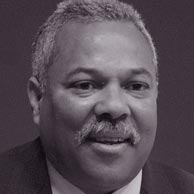
Arrindell, Nicholas
Champion of Change - Black Faculty and Staff Association Founder
Arrindell,
Nicholas

Arrindell, Nicholas
Champion of Change - Black Faculty and Staff Association Founder
The Black Faculty and Staff Association (BFSA) came together, as so many advocacy groups do, over lunch and a conversation. Lunch was at the Polo Grill, then a restaurant across from Homewood Field, and the people who had gathered to talk were black senior staff members concerned about the lack of support for people of color at Johns Hopkins. Toni Moore-Duggan, one of the participants, recalled how that lunch and subsequent discussions among the staff members led to their decision in 1995 to establish the BFSA. “After graduating from Johns Hopkins and while working there, it became evident that there was no voice or forum for black people having difficulties here,” said Moore-Duggan, a certified nurse practitioner who worked at the institution for years. At first, Moore-Duggan said, she and the other staff members were not sure if anyone would buy into efforts to create a forum for people of color, but they did. Seventeen years later, the group is not only going strong but has expanded its mission: to help foster a culture of collaboration by promoting and enhancing the identity and professional welfare and growth of faculty, staff and students through collaborations, community service, education, research and cultural activities. The BFSA has also charged itself with being a crucial resource for the continued success of Johns Hopkins through the development and cultivation of relationships with key leaders of the institution. Nicholas Arrindell has served as director of the Johns Hopkins University Office of International Student and Scholar Services since 1991. He holds a doctorate in comparative and international education from the University of Maryland, College Park. Arrindell led a university-wide task force to ensure Johns Hopkins’ compliance with Immigration and Naturalization Service regulations. As a member of the university’s Diversity Leadership Council, he created the video series Who Belongs in America. He also established the Mid-Atlantic Immigration Workshop and participated in the Fulbright International Education Administrators Program, in Germany
-
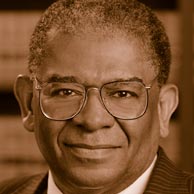
Baker, Bruce
Catalyst for campus change—Black Student Union Pioneer
Baker,
Bruce

Baker, Bruce
Catalyst for campus change—Black Student Union Pioneer
Empowered and inspired by the civil rights movement, students John F. Guess and Bruce Baker presented 12 demands to Johns Hopkins University administration in 1967. They sought such changes as increased black student enrollment and black faculty recruitment, a library section for black authors, and Johns Hopkins-Morgan State mixers.
A year later, Guess, Baker and others established a Black Student Union at Johns Hopkins. Although similar groups had already formed at other university campuses, students at Johns Hopkins found their initial requests for official recognition rebuffed. The student council expressed concern that this student union would be seen as hostile and divisive. Continued and mounting pressure from Guess and Baker caused the student council to reconsider its decision and grant official status in 1969. Guess would later be elected the university’s first black student council president.
The Black Student Union remains an influential group at Johns Hopkins-promoting diversity, respect, and understanding. The group also hosts events and lectures, organizes community service projects and works to improve the climate for black students at Johns Hopkins.
Its founders continue to serve as prominent community leaders.
Baker served as the BSU’s first president. After earning undergraduate and graduate degrees from Johns Hopkins, Baker worked as an economist with the Department of Agriculture and completed a law degree at the University of Chicago. He started his legal practice in banking and finance as an in-house attorney with the largest bank in Chicago, moving on to become the first black equity partner at Winston and Strawn LLP and then the first black equity partner at Baker & Mckenzie LLP. He is now a partner at the law firm Hoogendoorn and Talbot LLP.
-
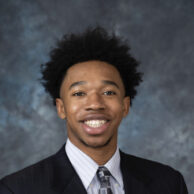
Bartlett, Ethan
Student-Athlete Leader
Bartlett,
Ethan

Bartlett, Ethan
Student-Athlete Leader
Basketball recruiters lured Ethan Bartlett to Johns Hopkins from White Plains, NY, in 2018, but it was the academic challenge and the opportunity to be a true student athlete that sealed the deal. “Blacks make up only about five percent of the student-athlete population at Hopkins,” he explained. “My coaches have been super supportive. They’ve been helpful in supporting me when I spoke up about things that I thought were important.”
In the summer of 2020, just after the murder of George Floyd, the Athletics Department held an online meeting where coaches and administrators invited Black student athletes to share how they were feeling. “People talked about microaggressions they’ve experienced in Hopkins institutions. We saw the need to create a space where people could speak to that aspect of their identities, things they might not have felt comfortable discussing with their teammates or coaches,” Bartlett said, describing some of the reasons he and his colleagues founded the Black Student-Athlete Association.
“Hopkins can be overwhelming,” he admits. “It can be difficult to figure out what fits your interests. The BSAA has helped, creating that pathway, getting people connected to resources and volunteering opportunities.” The group has formed a partnership to tutor high school students who fell behind during the pandemic. Leveraging their positions as student athletes allows members to make a strong impression. “We taught a virtual lesson to fifth graders about social justice and activism within sport. It was awesome. They were very engaged and had a bunch of amazing questions.” The organization has hosted both virtual and live “literacy events” where Hopkins professors discuss issues such as housing and homelessness, police violence, and education. A particular mentor for Bartlett, Professor Lawrence Jackson, led a session on the history of Baltimore and Johns Hopkins University’s place in that narrative.
Having a roommate (and teammate) from Baltimore for four years gave Bartlett an insider’s view of the city. “People have a lot of misconceptions about Baltimore. While there are areas that are unsafe, they aren’t an accurate representation of the entire city,” he explained. “Baltimore has so much to offer. There are vibrant, creative people here, people who are resilient.”
Bartlett majored in public health and minored in entrepreneurship and management, graduating in December 2021. “My interest is the intersection between gun violence and law enforcement,” he explained. A tragedy involving a family friend killed by police sparked Bartlett’s concern when the officers involved were not convicted. “I’ve watched this unfold for the greater part of my life. That’s been the inspiration for my academic path. I want to reform police systems, and qualified immunity. Its origins are tied to slavery. There are so many problems—you need to overhaul the entire system.” Bartlett realized he needed to sharpen his leadership skills so he enrolled in a course titled “Leading Teams.” At its conclusion, the professor offered him a teaching assistantship for the next term, a position he still holds as a graduate student.
The opportunity to pursue a master’s degree at the Bloomberg School of Public Health, home of the Johns Hopkins Center for Gun Violence Prevention and Policy—combined with the chance to continue playing basketball for Hopkins—provided obvious incentives to remain in Baltimore. “People are at different stages of their lives in graduate school,” Bartlett said. “Some are starting second careers; some are already working in the field and are getting their degrees while they work. You learn so much from their lived experiences.”
-
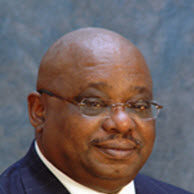
Bates, Ernest A.
Entrepreneurial Neurosurgeon Extraordinaire
Bates,
Ernest A.

Bates, Ernest A.
Entrepreneurial Neurosurgeon Extraordinaire
In 1958, the year he received his bachelor’s degree from the Johns Hopkins University, Dr. Ernest Bates had no idea how strong – or how instrumental – his connection to his alma mater would be. Years after receiving his undergraduate degree, Bates, the first African-American to enter the Zanvyl Krieger School of Arts and Sciences, served on the Johns Hopkins University Board of Trustees, including as vice chair. Currently a trustee emeritus, Bates is a former chair of JHU’s annual fund, which honored him in with the Heritage Award in 2003. Indeed, the education Bates received at JHU helped catapult him to the upper echelon of both medicine and business. As a student at JHU, Bates was also the first African-American to play on the university’s football team, a trying time for the young man whose team endured discrimination at times, such as not being allowed to dine at certain places because of Bates’ race, while on the road for away games.
Following graduation from JHU, Bates, a native of Mount Pleasant, N.Y., went on to earn his medical degree from the University of Rochester School of Medicine in 1962. That same year, he completed a surgery internship at the Albert Einstein College of Medicine, Bronx Municipal Hospital Center. He completed his neurosurgery residency at the University of California Medical Center, San Francisco (UCSF) in 1971 and was board certified in neurological surgery in 1973. In 1977, Bates founded American Shared Hospital Services, a publicly traded healthcare company that leases state-of-the-art medical equipment to hospitals in the United States and abroad. Bates is chairman and chief executive officer of the San Francisco-based company. In 2016, Bates endowed a professorship at UCSF’s School of Nursing.
Now semi-retired, Bates is a member of several professional medical societies. He has written chapters in the publication, Textbook on Experimental Brain Tumors and Black Related Diseases. He is an emeritus member of the University of Rochester’s Board of Trustees, a member of the Board of Overseers at UCSF School of Nursing, and a former member of the Board of Trustees at UCSF Foundation and the California Higher Education Business Forum. In 1997, Bates was appointed to the California High-Speed Rail Authority. He also served as a member of the Board of Governors of California Community Colleges, the District 4 Medical Quality Review Committee, and the Professional Advisory Committee at the University of California Medical Centers. Bates previously served on the California Commission for Jobs and Economic Growth and the Magistrate Judge Merit Selection Panel.
More information about Dr. Bates
Oral History Interview from 1999
Alumni News Article 2005 Leadership Weekend
-
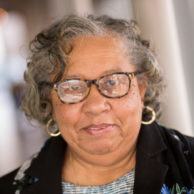
Bates-Hopkins, Barbara
Connecting JHU with the community
Bates-Hopkins,
Barbara

Bates-Hopkins, Barbara
Connecting JHU with the community
Barbara Bates-Hopkins calls herself “the eyes and ears of the community.” As a senior community research coordinator in the Department of Environmental Health and Engineering at the Bloomberg School of Public Health who “grew up here, I can remind everyone”—nurses, doctors, scientists, students, residents of the neighborhood, and everyone she encounters—“that East Baltimore was once a much different place. There were lots of nice stores and plenty to do. Kids respected their elders. There was diversity and a different spirit to the place. I particularly like to share that with the students so they know the history.” With funding support from the Institute for Clinical and Translational Research and the Sidney Kimmel Comprehensive Cancer Center at Johns Hopkins Johns Hopkins School of Medicine as well as the Department of Epidemiology at the School of Public Health, she surely connects the medical entities of Johns Hopkins.
As a lifelong resident of East Baltimore, Bates-Hopkins recognizes there is a lingering love/hate relationship between Johns Hopkins and its neighbors. “My job is to serve both the university and the people who live nearby or who have been uprooted by redevelopment,” she explains. Applying the solid case-management experience she has accumulated during her career, she motivates, guides, and supports those faced with the decisions and challenges of relocating. She also maintains strong ties with area leaders by serving on various community and health-related advisory boards, councils, and committees.
Maintaining a genuine rapport among various generations and between academics and community residents, Bates-Hopkins sees herself as a matchmaker, knowing what clinical research is under way at the university and suggesting how East Baltimoreans might both develop trust and benefit from participating. She makes no false promises. If she does not know the answer, she finds someone who does. “I try always to listen, be open, honest, and share information. I always ask, how can I help?”
Launched in 2006, the award-winning Day in the Market program is one of Bates-Hopkins most successful outreach initiatives. Together with medical colleagues from dozens of disciplines, four times a month she sets up booths at Northeast or Lexington Markets to educate the public with tips on safety, wellness, cancer screening, nutrition, disaster preparedness, and many other subjects. “Both sides learn from each other,” Bates-Hopkins reports. “The doctors particularly like being able to take more time with their contacts.”
“Ms. Bates-Hopkins supports numerous community partners by identifying volunteers, being an important node in the city’s community networks, and contributing to the conversation,” affirms Bloomberg School of Public Health Professor Norma Kanarek. “She is at the table during planning and execution of events throughout the year and across the city. Her indispensability is well recognized.” Planning, coordinating, developing, marketing, and promoting special urban environmental health projects remain Barbara Bates-Hopkins passion. And, she stresses, “it’s a blessing to work with colleagues who trust and give me the leverage to meet my objectives.”
-
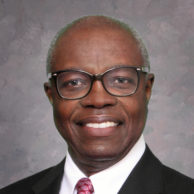
Benjamin, Ivor
Caring for the future
Benjamin,
Ivor

Benjamin, Ivor
Caring for the future
When Dr. Ivor Benjamin assumed the helm of the American Heart Association in July 2018, he talked about food and housing insecurity, and advocated for affordable, quality health care for everyone, as well as increased funding for the AHA’s primary concerns, cardiovascular disease, stroke, and brain health. “We can make a difference—in large and small ways—when we prioritize caring for the future,” he said.
Benjamin was one of only three black students when he arrived at the Johns Hopkins School of Medicine in 1978. He was “held spellbound” by cardiac surgeon Levi Watkins, who had recruited Benjamin (who also accompanied Watkins on later admissions tours) from Hunter College in New York City. “Levi had convinced the powers that be that the more diversified Hopkins was, the more successful the institution would be. He persuaded the admissions committee to welcome minorities as students” and the administration to increase minority representation on the medical faculty. “Levi was a real pioneer for medical and social justice.”
“Once you get to Johns Hopkins, you get swept up—it’s a humbling experience,” Benjamin remembered. “You know you’re not in a museum but the iconic images are everywhere. It’s a wonderful environment with a very high importance placed on both the science and the art of medicine. The commitment to excellence crystalized in me and gave me a competitive advantage—I began to think of myself as a future faculty member.” As a student, Benjamin worked in the laboratory of future National Institutes of Health Director Bernadine Healy and, under her tutelage, published his first paper in a medical journal. That effort solidified his interest in research and ongoing scholarship.
A native of Guyana, Ivor Benjamin emigrated from South America to the United States with his family after completing high school. After college and medical school, he assumed prominent roles at university medical programs across the nation and now serves as director of the Cardiovascular Center at Medical College of Wisconsin and, co-director of the NHLBI T32 Training Program in Signature Transdisciplinary Cardiovascular Sciences.
Decades ago, Dr. Benjamin became involved with the American Heart Association. From joining committees to editing journals, he has risen through the ranks to the organization’s top volunteer position. The recipient of generous mentoring throughout his life, Ivor Benjamin recognizes the importance of supporting and encouraging young investigators. He emphasized the issue in his presidential address, urging his AHA audience to “volunteer to speak to a STEM class at a predominantly minority high school or rural high school. When you meet students considering a career in science or medicine, invite them to shadow you for a day.” Dr. Benjamin also proved an influential role model at home. His three children have followed him into medical-related fields, including his daughter Charis, who is a 2019 graduate of the Johns Hopkins Bloomberg School of Public Health. Caring for the future indeed.
-
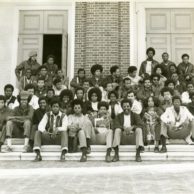
Black Students at Shriver Hall 1970
The collective experience of a community: a turning point for JHU. A Great Day at Hopkins
Black Students at Shriver Hall 1970

Black Students at Shriver Hall 1970
The collective experience of a community: a turning point for JHU. A Great Day at Hopkins
Relatively few black students attended Johns Hopkins until the late 1960s, when a concerted effort by the university increased their presence. Leslie King-Hammond, then a graduate student with a fellowship in art history, noted that “We came from all over the United States. We were not a shy group; we were highly politically aware.” In 1967, freshman John Guess and sophomore Bruce Baker led the push for the formation of the Black Student Union. The following year, the student body elected Guess president of the student council. Guess realized “Hopkins considered its undergraduates to be junior scholars. I understood we create our own opportunity.”
By 1970, a significant cohort was making its presence known in virtually every area of the Homewood campus and beyond. “We had a very strong network; we were always in touch with one another, both undergraduates and graduate students,” King-Hammond recalled. “Our habit was to gather after classes in Levering Hall to eat and talk,” Michael Smith (front row, second from left) remembered. “One day, word went out that we should all head over to Shriver Hall for a picture.” Ron Owens, assistant director of admissions, had enlisted sophomore Thomas Anderson to capture an image of some of the dynamic band of black students on campus that autumn. Owens (the only person in the photo wearing a tie) developed a multiyear campaign around this photograph to recruit more students. (He also engaged Michael Smith, Leslie King-Hammond, and others to travel to historically black colleges and universities in the South to entice promising candidates to come to Johns Hopkins for graduate school.)
Now a powerful record of a turning point in Hopkins history, John Guess (front row, holding a Black Panther newspaper) explained that “this iconic photo is us. It represents the collective experience of a community. It is so important to see us together as a group.” King-Hammond (behind Guess, wearing sunglasses) admitted that the university “was riddled with stereotypes and people who thought we would underachieve. Hopkins was competitive and demanding and we were frustrated by the relentlessness of the racism and sexism on campus.” Still, they did “create our own opportunities,” Thomas Anderson (front row, far left) acknowledged. He believes his time at Hopkins “prepared me as no other school would have then. The university gave me major support, understanding, and structure; what I learned there allowed me to exceed my goals in life.”
In 1993, the photograph became the centerpiece of a gathering of alumni, many of whom appear in the picture. Joined by staffers and friends, they came from as far away as California to reminisce and update each other on their lives and careers. The reunion was such a success that the group decided to gather annually and expand their ranks to include earlier and later alumni as well as current students. They dubbed themselves the Fred Scott Brigade to honor the first African American to earn a bachelor’s degree from Hopkins. “We never lost sight of each other,” John Guess explained. “We pay our own way to get together every year on the last weekend in September. More than a hundred people from many generations are members of the Fred Scott Brigade now, coming together to celebrate being black alumni from Johns Hopkins.”
Click here or the In the Media button above to see the names of the students on campus in 1970.
-
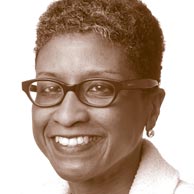
Boggs, Paula E.
Cross-country legal leader
Boggs,
Paula E.

Boggs, Paula E.
Cross-country legal leader
Everyone is good at something, but Paula Boggs is one of those people whose interests and abilities seem boundless. She describes herself as a curious person. Perhaps it is that curiosity that landed her jobs in such diverse industries as the military, technology and food services. Or maybe it is her openness to adventure that led her to train as a paratrooper and perform with a band. Her debut CD, A Buddha State of Mind, was released in 2010.
After graduation from Johns Hopkins in 1981, with a bachelor’s degree in international studies, Boggs enrolled at the University of California at Berkeley School of Law. While at Johns Hopkins, she co-founded the women’s cross-country and track and field teams. In doing so, she became the first black person to co-establish an NCAA competition sport at the university.
Boggs recently retired as executive vice president, general counsel and secretary of Starbucks to work on President Barack Obama’s re-election campaign. Under her direction at Starbucks, the company’s legal team played a role in all aspects of the coffee giant’s expansion in the early 2000s. At the time of her retirement, she was involved in the restructuring of the company.
Her path from law school to Starbucks reflects her diverse interests. She began as a U.S. Army officer assigned to the Pentagon before taking a position as a staff attorney position for the White House Iran-Contra Legal Task Force and as an assistant United States attorney.
In 1994, she was tapped to serve a one-year term as staff director for the advisory board on the investigative capability of the Department of Defense (created by the secretary of defense in response to the Tailhook scandal). In 2010, President Obama named Boggs to the White House Council for Community Solutions.
Between government service and Starbucks, Boggs became a partner in the prestigious Preston Gates & Ellis law firm and vice president of legal affairs for Dell.
Boggs is known as much for her community service as her legal prowess. While at Starbucks, she led the legal team in a pro-bono housing justice project for people who had been evicted from their homes, and she worked with company attorneys to draft wills for police, firefighters, and emergency medical technicians. Boggs is a member of the boards of directors of Johns Hopkins University, School of Rock, LLC and the American National Red Cross. She is also on the advisory board of listener-supported radio station KEXP in Seattle. For her many achievements, Johns Hopkins University honored her with a Distinguished Alumnus Award in 2009.
-
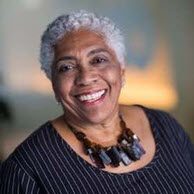
Bowie, Janice
Public-health role model: creating pathways and opportunities
Bowie,
Janice

Bowie, Janice
Public-health role model: creating pathways and opportunities
When Janice Bowie entered the Johns Hopkins School of Hygiene and Public Health as a 38-year-old doctoral candidate, she found a scarcity of role models who looked like her. This was a new challenge for a woman who came with confidence developed during her education at Shaw University in Raleigh, North Carolina, an HBCU (Historically Black Colleges and Universities), and later, while earning a master’s degree in public health at nearby University of North Carolina–Chapel Hill. She also brought fifteen years’ experience working for the Virginia Department of Health, including serving as director of its Division of Chronic Disease as well as establishing the department’s first Office of Minority Health. Her time working with public-health professionals in Richmond was enlightening: Bowie realized that without a doctoral degree, she “did not have a voice at the table.” She came to Hopkins in 1991, determined to train and amplify her voice, but discovered “few black faculty and students then.”
“Attending an HBCU provided me, a young African American, the opportunity to build self-esteem and gain an understanding of society’s expectations as well as an appreciation of what society offers,” Bowie explained. She believes HBCUs still afford African-American undergraduates “a place to be grounded in how society will treat them, and instill self-confidence to navigate work and adult institutions.” Bowie clearly grasped how to navigate the Bloomberg School of Public Health; upon receiving her doctorate in 1997 she was named an assistant professor on the faculty of Social and Behavioral Sciences in the Department of Health Policy and Management (now known as the Department of Health, Behavior and Society).
In addition to conducting and publishing research, Bowie says she now applies “knowledge from the academy to train others on the front lines of public health to achieve competence with methods, theories, and management techniques.” Her community-oriented research concentrates on advancing “participatory strategies and methodologies in addressing public-health issues and eliminating health disparities in minority and underserved communities.” In 2019, Bowie became the director of the Bloomberg School’s flexible, part-time Doctor of Public Health Program, designed for early- to mid-career public-health professionals.
Bowie strives to be the role model that was missing when she arrived at Johns Hopkins. “You get to be your best self in academia; I had the good fortune to work with bright and talented people” at the Bloomberg School, she observes, expressing gratitude “for those who came before.” Even now, she stays in touch with many of her former students and continues to mentor them because she “wants them to do better and more” than she has. She admits she has “pushed others forward onto the tenure track” to encourage younger, particularly minority, colleagues to “achieve success in the academy.” Creating pathways and opportunities has been her focus: “We won’t need diversity if we have equality,” she says. “Diversity becomes a non-issue.”